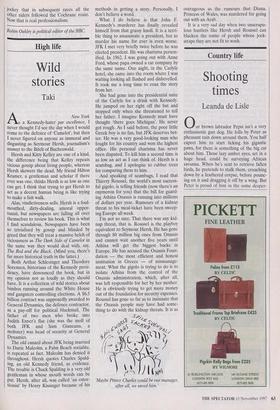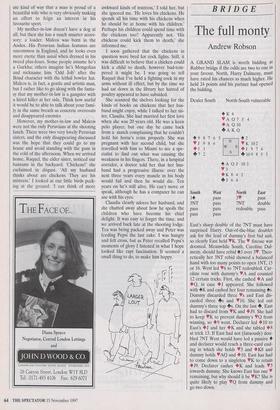Country life
Shooting times
Leanda de Lisle
0 ur brown labrador Pepsi isn't a very enthusiastic gun dog. He lolls by Peter as pheasant rain down around them. You half expect him to start licking his gigantic paws, for there is something of the big cat about him. Those lazy amber eyes, set in a huge head, could be surveying African savanna. When he's sent to retrieve fallen birds, he pretends to stalk them, crouching down by a feathered corpse, before pounc- ing on it and dragging it off by a wing. But Peter is proud of him in the same desper- ate kind of way that a man is proud of a beautiful wife who is very obviously making an effort to feign an interest in his favourite sport.
My mother-in-law doesn't have a dog at all, but then she has a much smarter acces- sory: a loader. Malcos was born in the Andes. His Peruvian Indian features are uncommon in England, and he looks even more exotic than usual when dressed in his tweed plus-fours. Some people assume he's a Gurkha; others imagine he's Mongolian and nickname him 'Odd Job' after the Bond character with the lethal bowler hat. Malcos is, in fact, a gentle and artistic man, but I rather like to go along with the fanta- sy that my mother-in-law is a gangster with a hired killer at her side. Think how useful it would be to able to talk about your fami- ly in the same breath as concrete overcoats and disappeared enemies However, my mother-in-law and Malcos were not the only Peruvians at the shooting lunch. There were two very lovely Peruvian sisters, and the only disappearing discussed was the hope that they could go to my house and avoid standing with the guns in the cold of the afternoon. When we arrived home, Raquel, the elder sister, noticed our bantams in the backyard. 'Chickens!' she exclaimed in disgust. 'All my husband thinks about are chickens. They are his mistress.' I looked at our little birds peck- ing at the ground. 'I can think of more awkward kinds of mistress,' I told her, but she ignored me. 'He loves his chickens. He spends all his time with his chickens when he should be at home with his children.' Perhaps his children could spend time with the chickens too? Apparently not. 'His chickens could kick them to death,' she informed me.
I soon gathered that the chickens in question were bred for cock fights. Still, it was difficult to believe that a chicken could kick a child to death, however bad-tem- pered it might be. I was going to tell Raquel that I've held a fighting cock in my arms without ill effect, but by the time we had sat down in the library her hatred of poultry appeared to have subsided.
She scanned the shelves looking for the kinds of books on chickens that her hus- band might enjoy, while I talked to her sis- ter, Claudia. She had married her first love when she was 20 years old. He was a keen polo player, but one day he came back from a match complaining that he couldn't hold his horse's reins properly. She was pregnant with her second child, but she travelled with him to Miami to see a spe- cialist to find out what was causing the weakness in his fingers. There, in a hospital corridor, a doctor told her that her hus- band had a progressive illness: over the next three years every muscle in his body would fail and then he would die. Ten years on he's still alive. He can't move or speak, although he has a computer he can use with his eyes.
Claudia clearly adores her husband, and she chatted away about how he spoils the children who have become his chief delight. It was easy to forget the time, and we arrived back late at the shooting lodge. Tea was being packed away and Peter was feeding Pepsi the last cake. I was hungry and felt cross, but as Peter recalled Pepsi's moments of glory I listened in what I hope looked like rapt fascination. It seemed a small thing to do, to make him happy.











































































 Previous page
Previous page